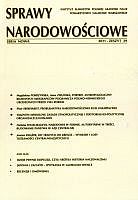Społeczne i kulturowe uwarunkowania i ograniczenia procesu pokojowego w Irlandii Północnej
Social and cultural conditions and limitations of the Northern Ireland’s peace process
Author(s): Ewa Szczecińska-MusielakSubject(s): Cultural Essay, Political Essay, Societal Essay
Published by: Instytut Slawistyki Polskiej Akademii Nauk
Keywords: Ulster’s conflict; loyalists; nationalists; discrimination; “Britishness” and “Irishness”; murals
Summary/Abstract: The conflict in Northern Ireland, sometimes called “The Troubles” (by British government), sometimes called “war” (by nationalists), has lasted since 1921. The article presents historical, structural and cultural background of Ulster’s conflict. Two main communities – catholic and protestant – are divided because of lots of reasons: one of them is different interpretation of history (“imagined histories”). On the social level the dominant position of the protestant community was supported by a system of discrimination. Two conflicted communities are integrated around different sets of values, symbols, norms. Feeling of belonging and group membership is connected with different ethnic identities. The peace process started in 1998 (Good Friday Agreement). Since then lots of changes have been put into execution in order to end political, social and cultural discrimination of the minority catholic community. Changes (reforms) at governmental level, like establishing new Northern Ireland Assembly or Northern Ireland Police Service, are very important. But equally important are changes on cultural and symbolic levels because they create space to re-defining ethnic identities. A good example of this could be The Re-imaging Community Programme, an initiative launched in 2006 by the Arts Council of Northern Ireland. The idea of the programme is to change – in cooperation with local people and artists – sectarian and fighting murals into neutral and create more friendly public space.
Journal: Sprawy Narodowościowe
- Issue Year: 2011
- Issue No: 39
- Page Range: 123-143
- Page Count: 21
- Language: Polish

